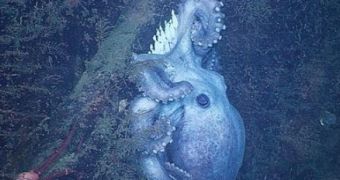Females belonging to an octopus species known as Graneledone boreopacifica spend well over 4 years waiting for their eggs to hatch and guard them during this entire time, researchers write in a study in the journal PLOS ONE.
What's more, it appears that, while waiting for its little bundles of joy to finally emerge from their eggs, the mother octopus very rarely has a quick bite to eat. It is still unclear how it manages to stay alive.
This peculiar breeding behavior was documented by wildlife researchers exploring a site in the depths of Monterey Canyon, a submarine canyon off the coast of California, US.
Specialists with the University of Rhode Island and the Monterey Bay Aquarium Research Institute say that, during a survey in 2007, they came across a female octopus that was clinging to a rock at a depth of about 4,600 feet (1,403 meters).
The wildlife researchers found the same female clinging to the same rock during 18 other surveys carried out over the following 4.5 years. Based on its appearance, it was clear it had not left the location.
The researchers say that, oddly enough, the octopus did not appear to have much of an appetite. It stayed focused on guarding its eggs and ignored crabs and shrimps crawling or swimming close to it.
The female octopus was last seen in September 2011. When another survey was carried out one month later, it was nowhere to be found, and its eggs all appeared to have hatched. The female is believed to have produced about 160 offspring.
Researchers explain that, by guarding its eggs for this long and constantly bathing them in fresh, oxygenated seawater, the female octopus made sure that, when its offspring were finally born, each and everyone of them was able to look after itself.
“The trade-off within the reproductive strategy of deep-living octopods is between the mother’s ability to endure a long brooding period and the competitiveness of her hatchlings,” the researchers write in their paper in the journal PLOS ONE.
“Graneledone boreopacifica produces hatchlings that are very highly developed, which gives them the advantage of a high potential for survival,” the University of Rhode Island and the Monterey Bay Aquarium Research Institute specialists go on to explain.
Given the fact that, while guarding its eggs, the female octopus grew visibly weaker and paler, it is believed that, shortly after its little bundles of joy emerged from their eggs all healthy and ready to take on the world, the mother passed away.
Commenting on this octopus’ breeding behavior, specialists point out that “The ultimate fate of a brooding female octopus is inevitably death, but in this first example from the deep sea, brooding also confers an extension of adult life that greatly exceeds most projections of cephalopod longevity.”

 14 DAY TRIAL //
14 DAY TRIAL //